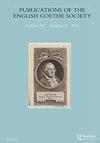歌德对理查·施特劳斯《变形记》的影响
IF 0.1
3区 文学
0 LITERATURE, GERMAN, DUTCH, SCANDINAVIAN
引用次数: 0
摘要
摘要1944年冬天,德国饱受战争蹂躏,理查德·施特劳斯阅读了歌德全集。在此期间,他创作了《变形记》,通常被认为是日耳曼文化的挽歌,其中引用了贝多芬的《情色》,题为“In Memoriam”。歌德对这部作品的影响比迄今为止所认识到的要大得多。我认为施特劳斯对标题的迟选引发了对乐谱概念内容的探索。仔细分析施特劳斯素描本中复制的歌德的两首诗,包括第一次在这里完整出版的音乐背景,揭示了一种“诗意的Idee”,它将作品中的多层意义统一起来。将《变形记》与其历史背景联系起来,我将这部作品解读为施特劳斯阅读歌德经历的自画像。本文章由计算机程序翻译,如有差异,请以英文原文为准。
The Influence of Goethe on Richard Strauss’s Metamorphosen (1945)
ABSTRACT While Germany was ravaged by war in winter 1944, Richard Strauss read the complete works of Goethe. During this period, he composed Metamorphosen, usually considered an elegy for Germanic culture with its quotation from Beethoven’s Eroica inscribed ‘In Memoriam’. Goethe’s influence on the work is far greater than hitherto realized. I argue that Strauss’s late choice of title invites a search for the conceptual content of the score. Close analysis of two poems by Goethe copied out in Strauss’s sketchbook, including a musical setting published here in full for the first time, reveals a ‘poetische Idee’ which unifies the multiple layers of meaning within the work. Relating Metamorphosen to its historical context, I interpret the work as a self-portrait of Strauss’s experience reading Goethe.
求助全文
通过发布文献求助,成功后即可免费获取论文全文。
去求助
来源期刊

Publications of the English Goethe Society
LITERATURE, GERMAN, DUTCH, SCANDINAVIAN-
CiteScore
0.10
自引率
0.00%
发文量
15
 求助内容:
求助内容: 应助结果提醒方式:
应助结果提醒方式:


